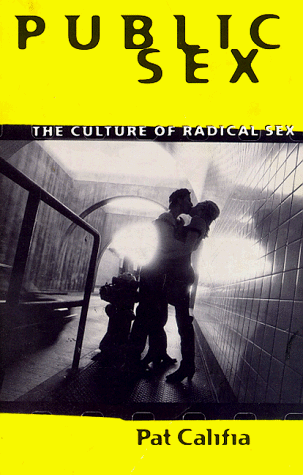Patrick Califia, first newsletter, censorship & KOSA, pleasure
First newsletter from T Fleischmann, author of Time Is the Thing a Body Moves Through. Transsexual thoughts on books, gay history, rural living, and collective liberation. Thanks for reading!

As the second Trump regime progresses, I have been reading Patrick Califia’s Public Sex (1994), a collection of his radical journalism. The fascists are working to erase transsexual history and culture, and so I have been eager to return to those lessons. Gay and trans life in the United States took shape in direct conflict with the police state, and many of our stories grapple with questions that are thrown into relief today. They are stories of resistance to state-sponsored eradication, censorship, and political repression, and now as always they are life-giving.
The history of the ‘50s and McCarthyism made it clear that you cannot save yourself by keeping your head down and hoping the people who made you a member of a proscribed class will not ferret you out. If I was going to be called all those bad names anyway, I might as well be the first one to spread the good news. When you come out, you make yourself vulnerable to disapproval, criticism, and discrimination. But you also get to define your own terms. You get to go first and be the one to say who you are and what that means.
That’s Califia in the introduction, reflecting on the oldest article in the book, 1979’s “A Secret Side of Lesbian Sexuality.” Published in The Advocate during the gay rag’s unfortunate transition to national respectability, the article defends and describes dyke BDSM culture, and led to a harsh backlash against Califia from lesbian and feminist communities. The publication of his milestone Sapphistry: The Book of Lesbian Sexuality was nearly canceled in the aftermath. Through decades of writing that followed, Califia continued to publish in a relatively small number of countercultural and independent presses and gay magazines that were willing to engage with his subject matter.
Transsexuals have gone to incredible lengths to preserve our histories, which starts with surviving and finding each other. The fascists correctly recognize that transsexuality is revolutionary, a threat to totalitarian control, and so they try to destroy us first. Ultimately, they always fail. Trans life thrives. But gains and acceptance can be quickly undone, and it is the fight that determines how much is lost and what saved along the way.
Writing in the eighties and nineties, Califia straddles two eras of heightened censorship and illegality. Behind him stretch decades when the owning, printing, selling, and mailing of gay and trans material was much more heavily criminalized, with regular police and FBI crackdowns. Ahead of him, a new kind of surveillance and censorship arises in the chaos of the early AIDS crisis, aided by technological advancements. His work on leather sex, dykes, pornography, and other heavily censored topics positioned him often at the center of this state censorship, including as a defendant in some significant trials, but even so, Califia remarks regularly about how much worse it used to be. How heavy the policing was before, and in what new ways it was then being employed.
As much as there is precedent now in what came before, today’s fascists and their atrocities are also unique, some threats new.
Writing this article is painful because it brings back the outrage and hurt I felt at being ostracized from the lesbian-feminist community. I’ve been a feminist since I was thirteen and a lesbian since I was seventeen. I didn’t lose just a ghetto or a subculture– lesbian-feminism was the matrix I used to become an adult. Fortunately, for my sanity and happiness, I managed to construct a new social network. My friends and lovers are bisexual women (some of whom do S/M professionally), gay and bisexual men, and other outlaw lesbians. If I were isolated, I would not be strong enough to speak out about something that makes me this vulnerable.
The Trumpist attacks on trans people, designed to shatter our communities and disrupt alliances, have predictably led to hand-wringing and a rightward lurch from many assimilation gays. It’s the same tired argument, that if we lose the sex freaks and screaming queens, the community would find acceptance. When of course, the sex freaks and screaming queens are the community, so how can you advance without them? This is echoed in the straight world, also, where many within the liberal establishment and mainstream media are all too eager to sacrifice transsexuals and vulnerable minorities whose rights they perceive as being unpopular. Others appear to have only been waiting for an opportunity to reveal their own animus.
Califia writes about both the social dynamics of his political fights and the gritty, material details of how it all played out. He locates his power in the community that holds him, which has to be continually redrawn and reordered outside of neat lines of identity or embodiment. He also charts the fascist work being done within gay and feminist communities, the day-to-day organizing that backed the emerging anti-porn, anti-kink, anti-sex work movement of the eighties.
I find especially illuminating a pair of articles about the anti-porn crusades. He charts in real-time the formations and movements of some of these right-wing organizers, including the group Women Against Violence in Pornography and the Media. While reading these articles, I think often of LibsofTikTok, Rowling, and others.
WAVPM grew out of a 1976 conference called “Violence Against Women.” Friends of mine who attended came back from it almost incoherent with rage. Suddenly, no other issue but violence against women was important. But this did not result in more volunteers’ signing up at Women Against Rape or the Case de las Madres, a shelter for battered women. It resulted mostly in a lot of vituperation about pornography. The conference had included a display of visual image of violence against women, many of them “kinky” pornographic images. Presented in that context, they incensed almost every woman who saw them.
From here, he narrates the entrance of academics Catharine MacKinnon and Andrea Dworkin into the anti-porn movement through a series of legislative attempts and failures. This begins when the Minneapolis City Council brings the two professors in to write a law to ban massage parlors and adult bookstores, an attack on immigrant and gay communities.
A result of our gerontocracy, as those in power cling to their positions for decades, is that the same assholes have haunted the United States for my entire life. Nixon’s gremlin-cuck Roger Stone, for example, is somehow still around. Likewise, the gay-haters that would have been working-age adults in the late twentieth-century are now in their sixties and seventies, and often still in power. Catharine MacKinnon is currently an endowed professor at the University of Michigan Law School, and also a Visiting Professor at Harvard Law. As recently as 2012, she held a special advisory role to the Prosecutor of the International Criminal Court.
Way back in the eighties, however, she and Dworkin were being paid $70/hour to write laws banning porn. Califia reports on the hard facts, noting everything from the pay of their assistants ($3.50/hour, five percent in comparison) to the shoddy academic methods and manipulated testimonies that were employed. Ultimately, the mayor of Minneapolis vetoed the first bill, but only after making significant concessions to the right. During the political battle, a supporter of the law lit herself on fire in an adult bookstore to protest the pornography being sold there.
Dworkin and MacKinnon went on to draft similar bills in other cities, increasing allying themselves openly with Republicans who exhibited clear antigay hatred. Califia notes a 1984 Take Back the Night march during which anti-abortion organizers marched openly with the anti-porn movement for the first time, but he also notes the local feminists groups that began to form in opposition to the censorship, self-organized. Ultimately, courts strike down the Dworkin and MacKinnon authored bills that do squeeze through, which are legally unsound, and which cost the individual cities hundreds of thousands of dollars in legal fees.
Why should we worry about a law that is so poorly written, so blatantly unconstitutional, a law that would only affect a particular city or county even if it did survive judicial review?
We should worry because this porn bill creates a moral panic wherever it goes. In its wake, it becomes easier to pass more traditional obscenity laws. It takes time and energy away from other crucial issues and makes it more difficult for us to combat homophobia…
While MacKinnon was fighting X-rated videocassettes in Indianapolis, the police were downtown in the gay district, videotaping whoever came through… After unprecedented numbers of complaints of police brutality were filed, hundreds of protester gathered week after week...
It took this anti-porn movement over forty years, but today, porn has been effectively banned in a number of states. Books are being pulled from libraries and schools. And like Califia describes, in the wake even of failed censorship, we’re left vulnerable to worse.
KOSA, the Kids Online Safety Act, is the current iteration I’m tracking, a censorship bill claiming to protect children but that in reality is designed to harm gay and trans minors. Unlike in some of the anti-porn fights of the eighties, in which Califia documents local Democrats acting in unison to oppose, the right has bolstered support for KOSA among Washington Democrats, increasing the risk of its passage.
A good explanation of KOSA and its dangers can be found in this article, written by digital rights activists Evan Greer and Anna Bonesteel and published in them. I’m a low-tech person, and I’m grateful that there are brilliant trans voices I can follow in understanding these things. I first became an Evan Greer fan for their folk punk music, and lately they have been sharing digital security information with punn-y guitar covers of popular songs, like Taylor Swift’s “We Are Never Ever Getting Back Together” but about breaking up with Google, and a reminder to update your software set to “You Oughta Know.” This, like their journalism, is I think exactly in the spirit of Califia writing for The Advocate. It’s a matter of survival, so you hitch up your skirt and you get the information out to the people, and try still to enjoy yourself along the way.
Digital trans media did not exist in the same way when Califia was writing, of course, except for some early trans forums, themselves echoes of the postal correspondence and gay press classified ads that allowed many gay people to find each other in the early twentieth century. Today, independently produced and distributed trans media thrives in digital and material spaces, and it is striking that I can also find the trans press in them, a Conde Nast publication, and also in Teen Vogue.
(Don’t miss Dean Spade in them, The Summer’s Hottest Trend Is Resisting State Oppression!)
Dworkin and her ilk hate pornography so much that they are prepared to run roughshod over our right to privacy and the First Amendment. These constitutional rights are fragile and incomplete, but we can’t afford to toss away the little bit of protection that we have from government intrusion and control. Don’t be deceived by claims that the WAP law is good for women’s right or anybody else’s rights. It’s just a new ploy to make it possible for the state to censor free expression under the guise of “protecting” a vulnerable class. While trumpeting against the evils of S/M and pornography, Dworkin is trying to distract us while she tamps a gag into our mouths.
As frustrating as it is today to watch the same cynical ploys and disingenuous, hateful arguments play out, I’m encouraged by Califia’s work, dogged and uncompromising. The Trumpists are incredibly dangerous and genocidal, and they’re killing millions of people, but they are also clowns. They are weak and easily defeated, if we stand up to them.
In that regard, the last section of the book, “Sluts in Utopia: The Future of Radical Sex” includes a list, “Forty-Two Things that You Can Do to Make the Future Safe for Sex.” It is a practical combination of political organizing, self-expression, and other actions for liberation. Defend an abortion clinic. Help women get through right-wing pickets and into the building. And: Do regular self-examinations for breast and testicular cancer. And: If somebody tries to ban a book at a school or public library, go to the hearing. You wouldn’t believe how easy it is to win these battles if you just show up and speak up. And: Masturbate, and don’t hurry.
I end this first newsletter and encourage you to check out some of Califia’s writing. Public Sex still circulates, and some anonymous comrades over at TransReads.org have made much of his writing freely available. What a gift!
I expect I will write in this newsletter once or twice a month, and that I will read some more old transsexual books, and perhaps share some other writing. We will see!

A stray thought: I agree largely with Califia regarding age of consent laws, especially his arguments for the liberation of children, abolition of prisons, and the need to protect young gay and trans children from their families, churches, and educational institutions (the attempts on the right to legalize child labor and outlaw trans children are two sides of the same fascist project, authoritarianism of the family and the workplace). I emphatically depart, however, with some of his other points on this topic, which I find horrifying and wrongheaded. Reflecting on this left me wondering if it is true that readers today are less willing to engage with potentially upsetting or disagreeable content, or if this is a false perception. It’s not as though boomers are known for consuming media from divergent political points.
Regardless, it is important to collaborate across political difference and through clashing ideologies. This is a skill that reading helps refine, and that we are in dire need of today. What a joy to live among trans people, who are so wacky you get to practice this all the time!
